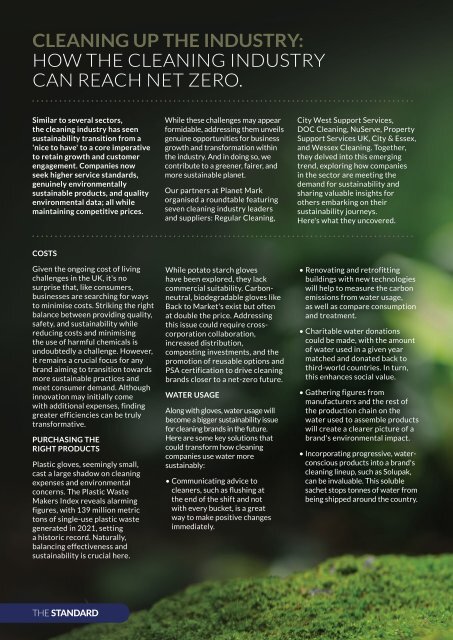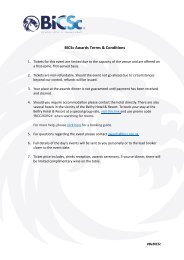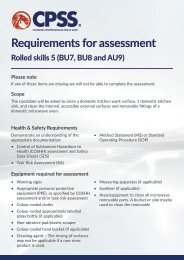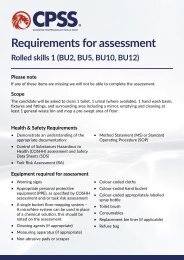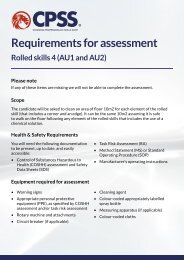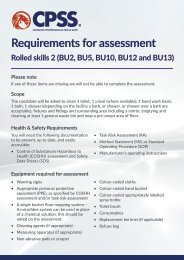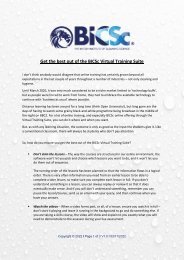The Standard Issue 4 2023
Read the latest issue of The Standard today!
Read the latest issue of The Standard today!
You also want an ePaper? Increase the reach of your titles
YUMPU automatically turns print PDFs into web optimized ePapers that Google loves.
CLEANING UP THE INDUSTRY:<br />
HOW THE CLEANING INDUSTRY<br />
CAN REACH NET ZERO.<br />
Similar to several sectors,<br />
the cleaning industry has seen<br />
sustainability transition from a<br />
'nice to have' to a core imperative<br />
to retain growth and customer<br />
engagement. Companies now<br />
seek higher service standards,<br />
genuinely environmentally<br />
sustainable products, and quality<br />
environmental data; all while<br />
maintaining competitive prices.<br />
While these challenges may appear<br />
formidable, addressing them unveils<br />
genuine opportunities for business<br />
growth and transformation within<br />
the industry. And in doing so, we<br />
contribute to a greener, fairer, and<br />
more sustainable planet.<br />
Our partners at Planet Mark<br />
organised a roundtable featuring<br />
seven cleaning industry leaders<br />
and suppliers: Regular Cleaning,<br />
City West Support Services,<br />
DOC Cleaning, NuServe, Property<br />
Support Services UK, City & Essex,<br />
and Wessex Cleaning. Together,<br />
they delved into this emerging<br />
trend, exploring how companies<br />
in the sector are meeting the<br />
demand for sustainability and<br />
sharing valuable insights for<br />
others embarking on their<br />
sustainability journeys.<br />
Here's what they uncovered.<br />
COSTS<br />
Given the ongoing cost of living<br />
challenges in the UK, it's no<br />
surprise that, like consumers,<br />
businesses are searching for ways<br />
to minimise costs. Striking the right<br />
balance between providing quality,<br />
safety, and sustainability while<br />
reducing costs and minimising<br />
the use of harmful chemicals is<br />
undoubtedly a challenge. However,<br />
it remains a crucial focus for any<br />
brand aiming to transition towards<br />
more sustainable practices and<br />
meet consumer demand. Although<br />
innovation may initially come<br />
with additional expenses, finding<br />
greater efficiencies can be truly<br />
transformative.<br />
PURCHASING THE<br />
RIGHT PRODUCTS<br />
Plastic gloves, seemingly small,<br />
cast a large shadow on cleaning<br />
expenses and environmental<br />
concerns. <strong>The</strong> Plastic Waste<br />
Makers Index reveals alarming<br />
figures, with 139 million metric<br />
tons of single-use plastic waste<br />
generated in 2021, setting<br />
a historic record. Naturally,<br />
balancing effectiveness and<br />
sustainability is crucial here.<br />
While potato starch gloves<br />
have been explored, they lack<br />
commercial suitability. Carbonneutral,<br />
biodegradable gloves like<br />
Back to Market's exist but often<br />
at double the price. Addressing<br />
this issue could require crosscorporation<br />
collaboration,<br />
increased distribution,<br />
composting investments, and the<br />
promotion of reusable options and<br />
PSA certification to drive cleaning<br />
brands closer to a net-zero future.<br />
WATER USAGE<br />
Along with gloves, water usage will<br />
become a bigger sustainability issue<br />
for cleaning brands in the future.<br />
Here are some key solutions that<br />
could transform how cleaning<br />
companies use water more<br />
sustainably:<br />
• Communicating advice to<br />
cleaners, such as flushing at<br />
the end of the shift and not<br />
with every bucket, is a great<br />
way to make positive changes<br />
immediately.<br />
• Renovating and retrofitting<br />
buildings with new technologies<br />
will help to measure the carbon<br />
emissions from water usage,<br />
as well as compare consumption<br />
and treatment.<br />
• Charitable water donations<br />
could be made, with the amount<br />
of water used in a given year<br />
matched and donated back to<br />
third-world countries. In turn,<br />
this enhances social value.<br />
• Gathering figures from<br />
manufacturers and the rest of<br />
the production chain on the<br />
water used to assemble products<br />
will create a clearer picture of a<br />
brand's environmental impact.<br />
• Incorporating progressive, waterconscious<br />
products into a brand's<br />
cleaning lineup, such as Solupak,<br />
can be invaluable. This soluble<br />
sachet stops tonnes of water from<br />
being shipped around the country.<br />
THE STANDARD


